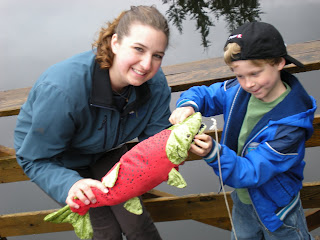Learning to fish with Tanya at Rice Lake
 Tanya is a Learn to Fish instructor who teaches basic fishing skills to kids and their families. Today at Rice Lake in North Vancouver she stood surrounded by a group of eager anglers-to-be and told them how to identify different types of fish and fishing gear. The rain fell lightly as she talked about casting and retrieving, knot tying, safety, regulations, and environmental awareness. This is Tanya's first season working with the Learn to Fish program started in 2006 by the Freshwater Fisheries Society of B.C. in cooperation with the Ministry of Environment, BC Conservation Corps(BCCC)and ActNow B.C.
Tanya is a Learn to Fish instructor who teaches basic fishing skills to kids and their families. Today at Rice Lake in North Vancouver she stood surrounded by a group of eager anglers-to-be and told them how to identify different types of fish and fishing gear. The rain fell lightly as she talked about casting and retrieving, knot tying, safety, regulations, and environmental awareness. This is Tanya's first season working with the Learn to Fish program started in 2006 by the Freshwater Fisheries Society of B.C. in cooperation with the Ministry of Environment, BC Conservation Corps(BCCC)and ActNow B.C.
Here's a description of the BCCC - found on the BCCC website:
"The British Columbia Conservation Corps is an exciting program that provides work opportunities for students and recent graduates who may be considering a career in the environmental sector. Projects undertaken within this program provide Corps members a chance to gain valuable, first-hand experience in a wide variety of scientific and technical roles that will contribute to conserving and enhancing British Columbia's environment."
Tanya is a geography student at Simon Fraser University and also a Girl Guide leader. She says she loves having this chance to work in the great outdoors with kids and their families. She works at other local lakes that are relatively easy to access for us urban folk. The Freshwater Fisheries Society stocks each lake with fish, and Tanya said Rice Lake was stocked earlier this week with 1000 rainbow trout. However, they aren't likely to bite the bait for a few more days, since they are getting used to their new environment. My son didn't catch one today, nor did anyone else we saw.
Tanya says sometimes people wonder why her program is encouraging people to fish. How is that beneficial to the environment?
"We find that if we encourage kids and families to go out fishing we’re actually creating environmental stewardship," Tanya says. "By getting these guys out to enjoy the environment with their friends and family, they’re actually going to enjoy the environment more. These guys are going to grow up to be protectors of the environment. That’s our goal of the program."
She told my son how to do fish CPR after removing the hook from its mouth: hold the fish under water and move it back and forth to get water moving over its gills. That gives it a better chance of surviving when you throw it back. (Poor Mr. Fish!)
Check out the Learn to Fish website for more information on how you can enjoy this outdoorsy activity.
Technorati tags
kids
fishing
Vancouver family activities
 “Card cannot be read. Please see attendant.”
“Card cannot be read. Please see attendant.” 
